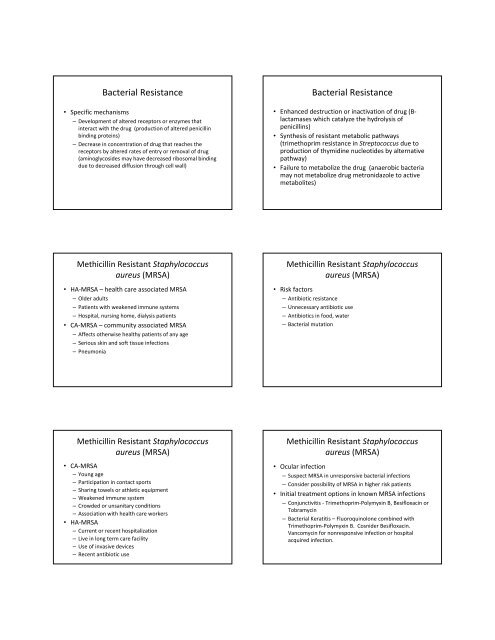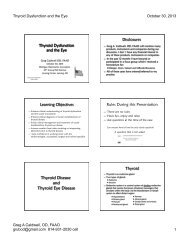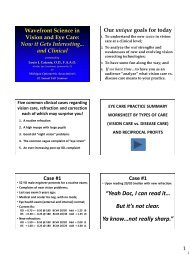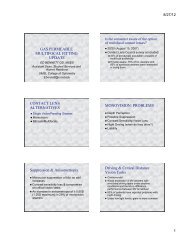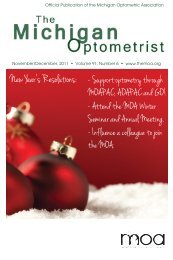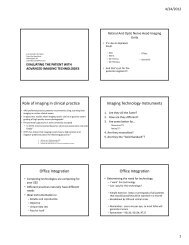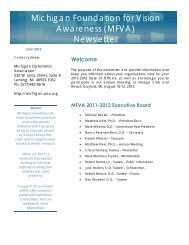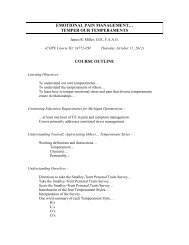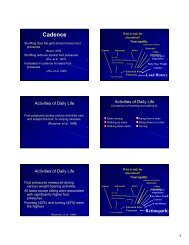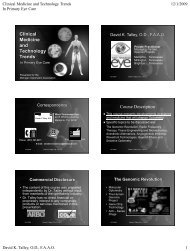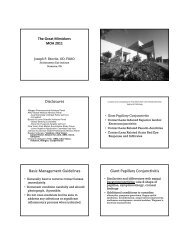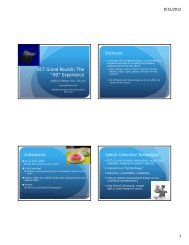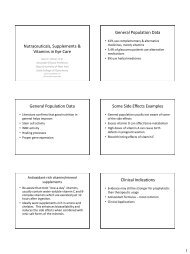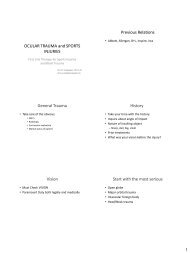Antibiotic Therapy For Todays Ocular Infections 2011 - Michigan ...
Antibiotic Therapy For Todays Ocular Infections 2011 - Michigan ...
Antibiotic Therapy For Todays Ocular Infections 2011 - Michigan ...
Create successful ePaper yourself
Turn your PDF publications into a flip-book with our unique Google optimized e-Paper software.
Bacterial Resistance<br />
• Specific mechanisms<br />
– Development of altered receptors or enzymes that<br />
interact with the drug (production of altered penicillin<br />
binding proteins)<br />
– Decrease in concentration of drug that reaches the<br />
receptors by altered rates of entry or removal of drug<br />
(aminoglycosides may have decreased ribosomal binding<br />
due to decreased diffusion through cell wall)<br />
Methicillin Resistant Staphylococcus<br />
aureus (MRSA)<br />
• HA‐MRSA – health care associated MRSA<br />
– Older adults<br />
– Patients with weakened immune systems<br />
– Hospital, nursing home, dialysis patients<br />
• CA‐MRSA – community associated MRSA<br />
– Affects otherwise healthy patients of any age<br />
– Serious skin and soft tissue infections<br />
– Pneumonia<br />
Methicillin Resistant Staphylococcus<br />
aureus (MRSA)<br />
• CA‐MRSA<br />
– Young age<br />
– Participation in contact sports<br />
– Sharing towels or athletic equipment<br />
– Weakened immune system<br />
– Crowded or unsanitary conditions<br />
– Association with health care workers<br />
• HA‐MRSA<br />
– Current or recent hospitalization<br />
– Live in long term care facility<br />
– Use of invasive devices<br />
– Recent antibiotic use<br />
Bacterial Resistance<br />
• Enhanced destruction or inactivation of drug (B‐<br />
lactamases which catalyze the hydrolysis of<br />
penicillins)<br />
• Synthesis of resistant metabolic pathways<br />
(trimethoprim resistance in Streptococcus due to<br />
production of thymidine nucleotides by alternative<br />
pathway)<br />
• Failure to metabolize the drug (anaerobic bacteria<br />
may not metabolize drug metronidazole to active<br />
metabolites)<br />
Methicillin Resistant Staphylococcus<br />
aureus (MRSA)<br />
• Risk factors<br />
– <strong>Antibiotic</strong> resistance<br />
– Unnecessary antibiotic use<br />
– <strong>Antibiotic</strong>s in food, water<br />
– Bacterial mutation<br />
Methicillin Resistant Staphylococcus<br />
aureus (MRSA)<br />
• <strong>Ocular</strong> infection<br />
– Suspect MRSA in unresponsive bacterial infections<br />
– Consider possibility of MRSA in higher risk patients<br />
• Initial treatment options in known MRSA infections<br />
– Conjunctivitis ‐ Trimethoprim‐Polymyxin B, Besifloxacin or<br />
Tobramycin<br />
– Bacterial Keratitis – Fluoroquinolone combined with<br />
Trimethoprim‐Polymyxin B. Cosnider Besifloxacin.<br />
Vancomycin for nonresponsive infection or hospital<br />
acquired infection.


